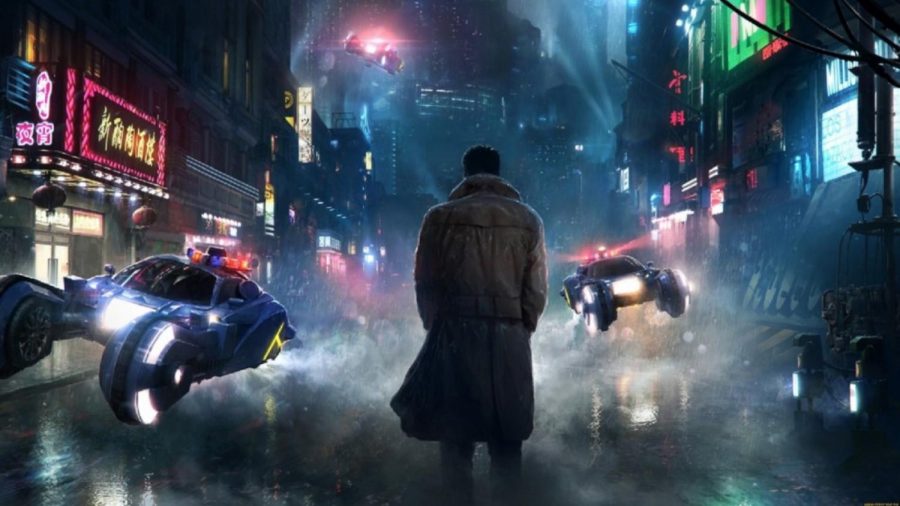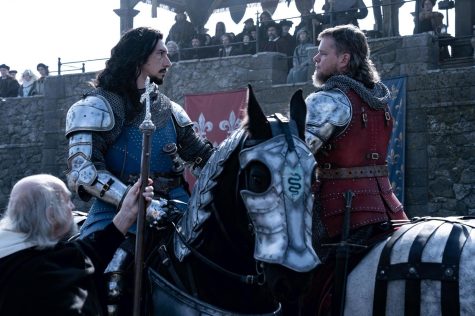‘Blade Runner 2049’ review: a technological achievement
Gosling plays ‘K,’ a new blade runner in charge of hunting down rogue replicants illegally living on Earth. Photo courtesy Slash Film.
Ridley Scott’s “Blade Runner” was released in 1982 and has become one of the most controversial science fiction films ever put to screen. Those who love it praise the film’s noir tone and dark futuristic vision. Those who hate it point out the film’s methodically slow pace and somewhat messy story. It’s so controversial that no one dared to attempt a sequel for 35 years. That is, until Denis Villenueve came along.
Denis Villeneuve — creator of such modern day classics as “Prisoners,” “Enemy,” “Sicario” and “Arrival” — publicly stated at last summer’s Comic-Con that he decided to direct the film because “they [Sony] will do the movie anyway and I don’t want somebody to f*** it up, and I decided, I’ll give my best and for better or worse, I’ll do it.” The risk pays off, as “Blade Runner 2049” is a bold yet calculated film — one we’re bound to be talking about for years to come.
Keeping with “Blade Runner” tradition, Villeneuve and the film’s producers have asked those reviewing the film to give away as few plot points as humanly possible — given that the basic storyline of “Blade Runner 2049” is in itself a spoiler. Therefore, the following plot synopsis is going to be kept ambiguous:
It’s been 30 years since the events of the first “Blade Runner” film. Decker (Harrison Ford) has gone missing, for better or worse. Agent K (Ryan Gosling) now holds his former job as a Blade Runner — someone who hunts down replicants (androids) that are illegally living on Earth (they’re designed to be slaves off-planet).
After responding to what should have been an easy in-and-out mission, K uncovers a web of mysteries that sets him down a path of unraveling clues and personal self-discovery. Navigating through this bleak, overpopulated yet oddly desolate wasteland of a planet, K’s journey is one that could change the fate of humanity.
Firstly, one cannot talk about “Blade Runner 2049” without mentioning the technical achievements that are at play. Roger Deakins’ work is nothing short of Oscar-worthy (he’s been nominated thirteen times, but has never won).
The cinematography of the film — especially a certain scene that takes place in a casino stage — is jaw-dropping as it casts a grim yet well-realized look over everything, similar to “Arrival,” as is the impeccable and well-timed soundtrack that accompanies it.
Villeneuve also deserves all the credit in the world for “Blade Runner 2049,” given that this film could have so easily gone wrong. “Blade Runner” has not, and should never be, a science fiction film in the same vein as “Star Wars.” Itsi a slower paced detective story set in the future, something “Blade Runner 2049” represents to the fullest degree. Nothing about “Blade Runner 2049” is a retread of the first film or treated as fan service — it expands the universe and the story in all the right ways.
What those ways are we can’t exactly talk about because of spoilers. Instead, something that can be discussed is the performances. This is a role that’s seemingly made for Ryan Gosling, and he’s able to capture the character brilliant. Harrison Ford may not be in the film as much as the trailers make him out to be, but when he’s there, he has a presence and delivers one of the better performances he’s given in his later years. Robin Wright, Ana de Armas and Sylvia Hoeks all stand out as well.
Then there’s Jared Leto, looking to redeem himself in the public eye after his controversial performance as the Joker in “Suicide Squad.” His character is essentially an eccentric weirdo — something Leto is no stranger to playing — whois responsible for the manufacturing of the replicants. There are times when his character works and there are times when Leto, once again, over-cooks the performance. However, it does lead to an impressively crafted and acted scene later on the film in a confrontation between Leto and Ford that may be worth the price of admission alone.
While “Blade Runner 2049” may incorporate certain themes in regards to technology that we’ve seen in other films and shows since the original “Blade Runner” was released — namely HBO’s “Westworld” and Spike Jonze’s “Her” — this film is entirely its own thing. Taking a beloved cult film and putting his own unique spin on it, Villeneuve once again proves that his name belongs up there with other modern-day auteur directors.











